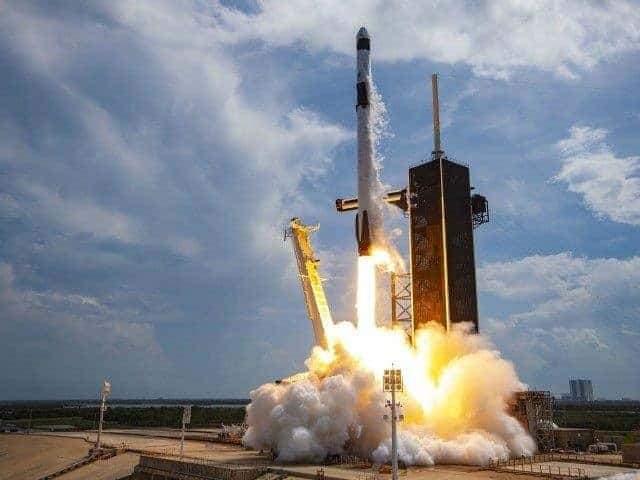UK Defence Minister: Space Will Be Next Battleground, Must Prepare for Satellite War with China, Russia

Britain’s defence minister has said that the UK must evolve its defence capabilities to respond to new threats from the skies from hostile actors like Russia and China.
Addressing the Air and Space Power conference on Wednesday on the future of combat air systems, Defence Secretary Ben Wallace said that to prepare for modern warfare, defence strategy “requires a rebalancing from Industrial Age to Information Age capabilities – investing in cyber, space, electronic warfare, AI, robotics, and autonomy – coupled with their integration with the best of what already exists”.
“The global picture has changed. Threats are coming from all different angles,” Mr Wallace said, adding that the country will have to prepare for what the “air and space environment of 2030, 2040 or even 2050 will look like” and consider “what will the role of our air and space forces” be.
Cyberwarfare, as well as the use of unmanned aerial vehicles (UAV) for intelligence and tactical strikes, pose a threat to national security, as does failure to remain “as nimble as our rivals” in reacting to the “disruptive capability” of the “aggressive application of machine learning, artificial intelligence, and quantum computing”.
In terms of defending the West’s fragile communications system, the defence minister said that “we know, all the while, that Russia and China are developing offensive weapons in space, [which is] a major cause for concern given that satellites don’t just provide our global communications, critical intelligence, and surveillance and navigation, but underpin our critical national infrastructure from mobile phones, to cashpoints, to the stock market.
“That’s why, in the future, what’s above you will be often more important than what’s in front of you.”
Alexandra Stickings, a research fellow for space policy at the Royal United Services Institute, told The Times on Thursday that hostile actors are capable of using lasers to “blind” satellites. Satellites are also vulnerable to hacking and high-power microwave frequencies that can disrupt internal electronics. Russia is reportedly performing tests to determine how close they can get to a satellite to “interfere with it or intercept information”, Ms Stickings said.
A U.S. military commander told TIME magazine in February that a pair of Russian satellites were following an American military satellite. Russia had launched inspection satellites in 2017. In 2007, China had successfully launched a missile from Earth that took out one of its own weather satellites.
The United States’s Space Force also reportedly has the capability to jam enemy satellite transmissions.
The newly-formed Space Force, the sixth branch of the U.S. military, was signed into being in December 2019. President Donald Trump said at the time: “Space is the world’s newest warfighting domain… American superiority in space is absolutely vital.”
The United States and the United Kingdom are not the only Western nations arming themselves for future warfare. France’s Emmanuel Macron announced in July 2019 that he would launch a “high command for space”, calling the new military focus on space a “true national security issue”.
Future-proofing the West’s telecommunications is also a key concern for Poland’s prime minister. Mateusz Morawiecki wrote on Wednesday that Europe must follow the United States’s lead in protecting 5G by freezing out the effectively Chinese state-own tech firm Huawei.
On Tuesday, Britain’s prime minister, Boris Johnson, announced that the UK would ban all new purchases of Huawei 5G equipment, cancelling its contract with the Chinese company to develop future telecommunications. The decision came after months of the United States warning the UK of the security risks posed by the company that the Pentagon has determined is controlled by the Chinese military, and that it could compromise British communications, enabling spying by Beijing.
U.S. Secretary of State Mike Pompeo is reported to meet with British Conservative Party China hawks on Tuesday. He will also meet with Prime Minister Johnson and hold a press conference with Foreign Secretary Dominic Raab, according to The Times. It is believed that the meeting between Pompeo and the China hawks, which includes former Conservative Party leader Sir Iain Duncan Smith, will put pressure on Johnson to accelerate the timescale for removing Huawei.
While the ban on new 5G equipment commences on December 31st, 2020, tech companies have until 2027 to remove all Huawei from their 5G systems. There have been no calls to remove the Chinese products for 2G, 3G, 0r 4G. Mr Johnson is reportedly still facing a Tory rebellion over perceived lax conditions of the ban.
Former Defence Minister Tobias Ellwood told LBC on Monday, before the government announcement, that he expects a cyber attack from China in revenge for removing Huawei.
China has threatened British businesses in response to the Huawei ban, with the Chinese state-controlled Global Times demanding that retaliation on the UK should be “public and painful”.
Photo: SpaceX via Getty Images




